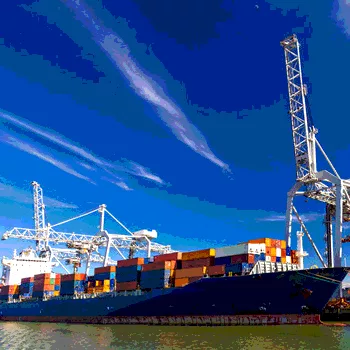Egypt Launches the Modernization of its Food Import Control System

A key milestone was achieved by Egypt’s National Food Safety Authority (NFSA) with the publication of its strategy to modernize the country’s food import control system, including the initial regulatory provisions to operationalize the strategy.
NFSA’s modernized approach assigns a level of verification to food import consignments based on the possible risks they may present in an effort to streamline the clearance process at Egyptian points of entry, according to their likelihood of compliance with Egypt’s food safety and quality requirements. In doing so, NFSA aligns its food import control requirements with the guidance of the Food and Agriculture Organization of the United Nations/World Health Organization Codex Alimentarius Commission, the international food standard setting body.
Avoiding any duplication of interventions related to food import controls between NFSA and competent authorities of food exporting countries to Egypt is also at the heart of the modernized approach and will be supported by a formal procedure for NFSA to review and recognize the robustness of a given jurisdiction’s food regulatory oversight. Prevention and risk-based interventions are two other key pillars of the food import control modernization, as demonstrated by (1) a stronger reliance on the pre-border management of food import consignments, including a pre-clearance mechanism, and (2) the adoption of enforcement and control measures that are commensurate with the level of possible risks posed by food consignments imported into Egypt.
Currently, all imported food consignments into Egypt are subjected to automatic sampling for compliance verification while the shipment is detained at the point of entry, pending a decision. However, under the modernized food import control regime, consignments will be subject to different levels of sampling and verification at the border based upon a transparent set of criteria that includes risk inherent to the food commodity, formal recognition by NFSA of the robustness of the regulatory authority of the food consignment’s country of origin, confirmed compliance of the consignment through a registered third-party or recognized foreign competent authority, and the history of compliance of the food importer.
Consignments belonging to a lower-risk food category destined to food importers with a documented compliance history will less likely be delayed at the border for sampling and may in fact be cleared immediately upon arrival at the Egyptian point of entry. The possible frequency of sampling for consignments of this category can be as low as 2 percent, under NFSA’s modernized food import control regime.
In order to enable expeditious clearance of such consignments, a pre-border notification must be made to NFSA at least 72 hours prior to the shipment’s arrival to Egypt, providing the necessary information for a risk determination to be made and for the assignment of clearance lanes corresponding to an incremental risk classification: green, yellow, orange, or red. Whether the shipment will be subjected to sampling or is held at the border, pending compliance verification, will be dependent upon its risk determination.
NFSA is also introducing additional measures to enhance its oversight on imported products even after they have entered the Egyptian marketplace, through dedicated compliance and enforcement campaigns intended to test the effectiveness of “pre-border” and “at-border” control measures.
“Through adopting this risk-based, modernized approach for food import control, NFSA is reiterating its commitment to the utmost protection of Egyptian consumers and to dedicating its resources, as the primary food safety regulator in Egypt, to those areas of the highest concerns. We are equally committed to modernizing the services offered to food business operators and to streamlining food import clearance protocols for the benefit of Egyptian food importers and processors,” declared Dr./Prof. Hussein Mansour, Ph.D., chairman of NFSA, who has initiated and is leading the transformation of Egypt’s food regulatory environment.
This paradigm shift in the way food import consignments will be managed, signaled by the publication of NFSA’s food import strategy including the corresponding initial regulatory provisions, also resonates with NFSA’s commitment to transparency, enhanced guidance for food business operators, and continuous improvement.
The latter values were referenced, at several instances in the strategy and the newly published food import control regulations, as being key values to be observed in the manner NFSA intends to manage the development of procedures and protocols meant to support the operationalization of the new provisions in an incremental fashion.
The board of directors of NFSA endorsed the new approach and approved the first regulatory requirements related to the new approach on July 22, 2020. The regulations will be made public on the Egyptian Official Gazette. It is expected that NFSA will continue to update its stakeholders on the progress of such operationalization, in addition to other food import control requirements, during the upcoming period.
Prof. Samuel Godefroy, Ph.D., is a Professor of Food Risk Analysis and Regulatory Policies, Food Risk Analysis and Regulatory Policies Platform (PARERA), Laval University, Quebec, Canada. Alex Samel, MBA, is Chief of Party, USDA–Transforming the Assessment and Inspection of Food Businesses (TAIB) in Egypt Project, Land O’Lakes Venture37, Cairo, Egypt.
Resources
NFSA’s strategy for modernizing Egypt’s food import control system may be found in the English language here: NFSA’s Modernization of Egypt’s Food Import Control System (English).
NFSA’s strategy for modernizing Egypt’s food import control system may be found in the Arabic language here: NFSA’s Modernization of Egypt’s Food Import Control System (Arabic).
Looking for quick answers on food safety topics?
Try Ask FSM, our new smart AI search tool.
Ask FSM →






.webp?t=1721343192)
